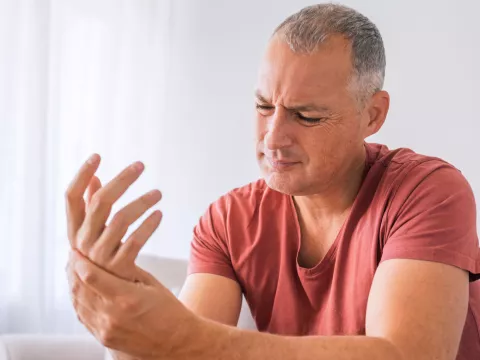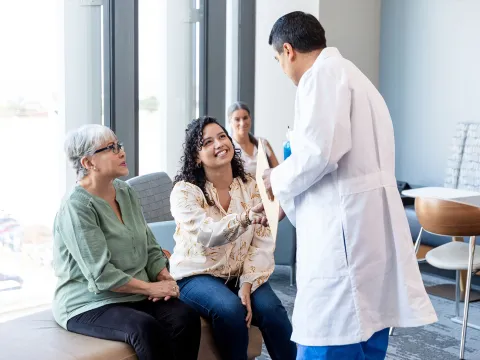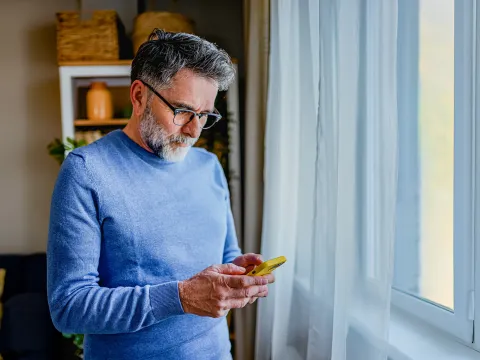- AdventHealth Centra Care

Burns, no matter how small, can be quite unpleasant. You can get different burns from fire, radiation, heat, electricity, boiling water, certain chemicals and even sunlight. While most small burns do not warrant a doctor's attention and can be treated at home, you need to be sure that the burns are minor enough to skip a trip to the doctor.
Read on to learn more about the three degrees of burns, how to identify them, treatment options and ultimately, when to see a doctor for a burn.
Types of Burns
First-Degree Burns
First-degree burns affect the top layer of the skin, are painful and make your skin red. They may cause a little swelling on the skin and are likely to become white when pressed. The skin on the burned area may start peeling off in a couple of days.
Second-Degree Burns
Second-degree burns are deeper in the skin, are very painful and are more likely to produce blisters. They make your skin very swollen, splotchy and redder than first-degree burns. Second-degree burns usually take between two and three weeks to heal.
Third-Degree Burns
Third-degree burns are the most severe type of burn. They turn your skin white or charred and induce numbness. These types of burns generally do not cause pain because of the damage to the tissue and sensory nerves in the skin. If you are concerned you might have a third-degree burn, you should seek medical assistance immediately. These burns take a very long time to heal and leave scars on the skin.
Treating Burns
Treating First-Degree Burns
Treating first-degree burns generally involves cooling the burn with cold water or a cold compress. Using an over-the-counter pain reliever like ibuprofen or acetaminophen can help manage your pain. Consider applying aloe vera or a mild, soothing moisturizer to assist with healing.
Treating Second-Degree Burns
Second-degree burns are more severe and involve both the outer and underlying layers of skin. As burns get more serious, it's more important that you seek medical attention for proper evaluation and treatment.
Treatment for a second-degree burn requires cleaning the wound, applying an antibiotic ointment and covering it with a sterile dressing. Professional pain management might be necessary, and your doctor may prescribe pain medication. Severe cases of second-degree burns may require specialized dressings, and in some cases, a doctor might recommend wound care at a burn center.
Treating Third-Degree Burns
Third-degree burns are the most severe and involve all layers of the skin and sometimes even deeper tissues. Third-degree burns require immediate medical attention. Call 911 to be taken to your nearest AdventHealth emergency room.
Treatment usually involves wound cleaning, removal of dead tissue and potential skin grafting. Pain management and infection prevention are crucial. Rehabilitation may be necessary after the initial treatment to maintain mobility and prevent complications.
General Burn Treatment Best Practices
- Avoid home remedies: While there are many home remedies suggested for burns, it's generally best to stick to medical advice and avoid applying butter, oil, toothpaste or other substances to burns.
- Cool the burn: For first-degree and minor second-degree burns, cool the burn under running cool water for about 10 to 20 minutes to help relieve pain and prevent further tissue damage.
- Follow medical advice: Always follow medical professionals' guidance and treatment plans. Proper care can help minimize scarring and complications.
- Pain management: Over-the-counter pain relievers like ibuprofen or acetaminophen can help manage pain. Prescription pain medication might be necessary for more severe burns.
- Prevent infection: Keeping your burn clean and dry is important to prevent an infection. Follow your health care provider's instructions for cleaning and dressing the wound.
- Protect the burn: Cover the burn with a sterile, nonstick bandage to prevent infection. Do not pop blisters, as they are a natural barrier against infection.
- Seek medical attention: For all third-degree burns, and for second-degree burns larger than a quarter or involving sensitive areas like the face, hands, feet, genitals or major joints, seek immediate medical attention.
When To See a Doctor for Burn Treatment
Whether your burns need a doctor's attention depends on several factors, including the degree of the burn, the location on your body, the source of the burn and the depth of skin damage.
Here are some burn-related tips to help you determine when to see a doctor:
Severe burns: If the burn is deep, covers a large area of the body or is located on the face, hands, feet, genitals or major joints, you should seek medical attention immediately. These types of burns have a higher risk of complications and may require specialized treatment.
Second-degree burns: If the burn is a second-degree burn (blistered and painful), regardless of its size or location, you should consult a doctor. They can assess the severity of the burn and recommend appropriate treatment.
Third-degree burns: Third-degree burns are severe and require immediate medical attention. Call 911 or go to the nearest emergency room if you or a loved one has a third-degree burn. These burns often appear charred, white or leathery and require specialized medical care.
Burns with infection signs: If you notice signs of infection, such as increased redness, swelling, warmth or pus around the burn area, you should see a doctor. Infections can be serious and need to be treated promptly.
Burns caused by chemicals or electricity: A medical professional should evaluate burns caused by chemical or electrical sources. These types of burns can have unique complications and they require specialized care.
Difficulty breathing: If a burn occurs due to inhalation of smoke or other harmful substances and causes difficulty breathing, seek medical attention immediately.
Health conditions: If you have underlying health conditions such as diabetes, a compromised immune system or other chronic illnesses, it's important to consult a doctor for even minor burns, as these conditions can increase your risk of complications.
Pain and discomfort: If a burn is causing severe pain and discomfort or you cannot manage the pain with over-the-counter medications, seek medical advice.
If you're unsure about the severity of a burn or how to care for it properly, it's best to consult a doctor. They can help determine if further medical attention is needed and provide the proper treatment.
Visit AdventHealth Centra Care Urgent Care for Burn Treatment
For severe burns, always seek emergency care. At AdventHealth Centra Care, our dedicated urgent care team is equipped to provide immediate attention to minor burns and will quickly get you back to feeling your best.
We believe health should be measured in terms of the whole person — body, mind and spirit. Our walk-in clinics are open seven days a week, with evening hours and located in Central Florida, Tampa, Kansas and North Carolina. Walk-ins are always welcome, or make an online reservation.





